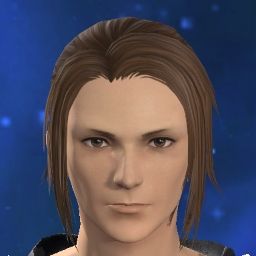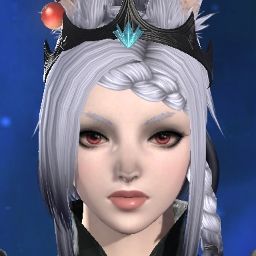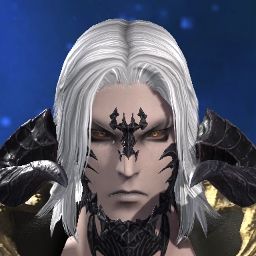I don't think that you understood my point. I did not mean the sundering kills someone in the conventional sense of the word, more like kills who they are as a person (hence the question of "what makes a person a person?"), and not just in regards to only memories, but in regards to their experiences, their relationships with their loved ones, their ways and views of the world, what languages they spoke and what culture they practiced, the things that make a person a person, which is way more than just memories.
It's hard to argue for something I never said. I never said the sundered are lesser or that I liked the ascians or Garlemald's actions. I don't have any grudges against Venat or any other character. In fact, I think she's another victim of the flawed narrative, and deserved way better.
About the ascians, Venat deliberately let Emet-Selch escape knowing what he will do (presumably because WoL needs the rejoinings to be strong enough? we weren't given any clarification about her intent), making her complicit in his and the ascian's crimes. But that is beside the point that I what making. Characters, ascians or Venat or any other, are merely puppets to the narrative of the story, which is what I was targeting. The problem isn't Venat, it's the writing and narrative as a whole.
And on the topic of it not being genocide, the term itself holds more meaning than just killing people. Preventing people from practicing their culture causing its death for example, is a form of genocide. Preventing them from speaking their language and letting it die is a form of genocide, preventing them from determining their fate and future is a form of genocide too.
I don't think I will argue further, it's disheartening to see what I say misinterpreted and me being treated as someone who agrees with ascians when I said nothing about that, or how "mute and dyslexic people are people" when I never hinted otherwise. I'm a disabled person myself, and have life-long conditions that affect my ability to function. Frankly, that hurt so much to read.
-
11-09-2023 01:50 AM #261(7)
-
11-09-2023 02:15 AM #262Player

- Join Date
- Aug 2012
- Location
- Limsa Lominsa
- Posts
- 439
- Character
- Alenore Llohen
- World
- Excalibur
- Main Class
- Lancer Lv 100
Pre-history would be before the First Umbral era.
Here's the rebutal.
This entire discussion doens't hinge on that, it rests on the sundering destroying the sense of self and most memories of the previous person, to a point they are virtually gone. This is what people mean when they say it "kills them".
The rest of the sentence is "but everything that defines the target, diluting its existence". Which means the soul, the memories, the reality of the being itself. His demonstration on Ryne literaly states they would be identicial in appearance, but reduced in all respects : "all is halved" to borrow is term.
Are we supposed to think every NPC that create images of itself is actually a form of sundering? I mean, it checks out since Argos is Venat's direct creation. But just recently, we had Oschon create images. Ifrit does it. Etc.
No, it doesn't kill him in the sense his soul went to the Aetherial Sea to be reborn. He also split a part of his soul in a controlled manner, with specific informations. Venat split everything in 14, she probably didn't take time to check every single being and how it'd affect them.
Inanimate objects don't have memory. The form of echo Venat use in Elpis is described as "piecing together an event from ripples left in ambient aether". The idea is aether simply has an afterimage of what happens. Since the Sundering splits everything (as said by Emet when he explained it), and since it's a well known fact that sunderign reduces the aetherial density, these memories are affected in the same way.
You still use the definition of killing as in "going back to the Sea", which, again, is obviously not what people mean when they said the Ancients were killed. Ancients themselves never had a chance to even go back to the Sea, since they were sundered, effectively removing their memories, and their presence from the world, instead replaced by 14 beings somewhat like them, but with gaping holes in everything.
See above
No, it's because it's exactly the same.
- Venat split souls, and creates new life from shards of the previous. The ones who were before are gone, to the profit of new people. In doing so, calamities happen and people of the Source face hardships.
- Ascians merge souls, reinforcing the source version. The shards are gone, to the profit of current people. In doing so, a calamity happens on the Source as well.(6)
-
11-09-2023 02:24 AM #263
-
11-09-2023 04:39 AM #264Player

- Join Date
- Jul 2015
- Location
- Meracydia
- Posts
- 3,883
- Character
- Lythia Norvaine
- World
- Gilgamesh
- Main Class
- Viper Lv 100
Thank you for taking the time to formulate a critique.
The word 'kill' used in the context of a living being carries an unambiguous meaning. If that's not what you're implying, you cannot use the word. Emet-Selch makes it fairly clear in his explanation in the Ocular that sundering 'does not strike at the flesh', and then demonstrates using Ryne as an example (spoiler: she doesn't die).
Death occurs specifically in reference to the physical body. A soul without a body feels the pull of the lifestream/underworld. We know this from the Tales of the Shadows short story 'Through His Eyes.' In some cases, that soul can find a suitable vessel before departing, as we saw in the case of the Phoinix, which was the original inspiration for the hemitheoi.
As for a discussion of what it means 'to be yourself' - we're not the same people that we were yesterday. What you're calling 'the self' is just your narrative of that change. Amaurot underwent radical changes in the time of the Final Days. During the time of Elpis, they were completely secular. The Final Days all but destroyed them. After summoning Zodiark, Amaurot converted to religious worship in the wake of His enthrallment. The Convocation sacrificed three quarters of their surviving population to their God. And then the Amaurotines were stripped of their powers by the Sundering. Every one of these changes irrevocably altered their culture. But again, you can't conflate cultural shifts in response to political events with biological death.
The journal text for the Lv.84 MSQ 'Helping Hands' contains the following line: 'After a few moments, a swirling mass of aether takes shape, and Argos appears in a flash of light. The aetherial guardian is as friendly as before and, perhaps sensing what is to come, creates reflections of himself, one for each of your companions. With that, your party is ready to cross the chasm and meet the moon's crew.'
I'm not really sure where you were going with your discussion of Lahabrea. During the Pandaemonium: Abyssos questline, Lahabrea splits his soul into two in order to seal his memories of Athena away. He also refers to Hephaistos as 'his twisted reflection' in the quest 'Servant of Violence.' He later reabsorbs those memories back into himself on Elpis during the Anabaseios quest 'Guided by the Past' in order to ensure that he would once again have the strength to lead.
Lahabrea and Hephaistos' interactions suggest that the memories encoded by souls are not destroyed by partitioning them. It also implies that splitting souls doesn't necessarily mean that a memory only belongs to one and not the other. Both Lahabrea and Haephaistos both retained all facets of their practical knowledge, despite being split into two different soul fragments. Saying that Venat 'probably didn't have time to do this' is a vague handwavy answer that we don't actually have any evidence for.
I do also note that you chose not to address the point about sundered souls, like Amon, retaining their memories of Amaurot and Elpis even after being reincarnated. This too, suggests that memory itself is not necessarily affected by sundering a soul.
Being able to piece together the memory of an event from the ambient aether implies that the memory is, in fact, encoded on it. It doesn't have to be the same thing as 'having a soul'. It's just a form of data storage.
The primary issue with rejoining shards is that it requires mass murder on a planetary scale in order to trigger the shift. In addition, those souls all have individual lives of their own. In Ardbert's case, he had lived and died in the time of the Flood of Light one hundred years prior. But I think it would turn into a problem if we suddenly started hunting down Azem fragments on other shards specifically in the name of becoming more powerful.(0)
-
11-09-2023 06:07 AM #265Player

- Join Date
- Jul 2015
- Posts
- 1,253
- Character
- Ashe Sinclair
- World
- Phoenix
- Main Class
- Thaumaturge Lv 60
Is this honest to god where we are with this now? It's not death because technically the sundering didn't cause an immediate cessation of their brain function? Genuinely? These are the straws you want to grasp at?
(7)
-
11-09-2023 06:14 AM #266Player

- Join Date
- Jul 2015
- Location
- Meracydia
- Posts
- 3,883
- Character
- Lythia Norvaine
- World
- Gilgamesh
- Main Class
- Viper Lv 100
It's not death because the in-game text makes it clear that it's not death. Was there anything else?
(6)Last edited by Lyth; 11-09-2023 at 06:25 AM.
-
11-09-2023 06:34 AM #267Player

- Join Date
- Aug 2012
- Location
- Limsa Lominsa
- Posts
- 439
- Character
- Alenore Llohen
- World
- Excalibur
- Main Class
- Lancer Lv 100
Do you think Emet-Selch actually sundered Ryne here and there, instead of just showing a projection through the Ocular? I may have misunderstood the situation, but all this was demonstrative. Neither did a single blow move 13 different planet in a circle.
Killing means ending a life. But destroying the body doesn't exactly kill somebody in FF : there's the Echo, and we summoned people from the sea multiple times. Multiple beings from different races were recreated in Ultima Thule, and seem to have kept going on with their lives.
Souls are in a big cycle, usually evolving the same way. Ascians who take body don't consider themselves dead. Teleporting or using flow just turns you into pure aether and thus destroying your body, just to be recreated on the other end. But since your soul and memories are left intact in a new meat suit, you're still alive. So was Zenos after he cheated death. And so were the scions when their spirits were on the First without a physical body, in the end it's just a flesh mecha for the soul.
Again, i'll stress that no, the Sundering didn't kill them as in "left their souls without a body, in such a way that their souls were going to the sea". But it killed them in all but name.
Note that I'm not telling you you're wrong. Stricto sensu, you're right. I'm just explaining what people mean when they say the Sundering killed them, and why they consider it a genocide. Death simply isn't just biological in XIV.
I'm quite certain at least one Ancient mentions gods during Elpis. Even if not overtly religious, they do know the meaning and the term and use it. Hemitheoi and Athena meant to reach the status of godhood. Whiletheir societies were not a theocracy, they did seem to understand the concept of gods, which means they most likely had faith in their society.
Now, though, the Convocation didn't kill the population. Not do we have any proof that their culture changed so drastically after summoning Zodiark. They literally summoned a god to grant their wishes, through their creation magic, the very tool they used to shape the Star. Why wouldn't they use their new God-tool to keep doing so? It just enables them to act on a larger scale, but requires more aether due to how widespread the effects need to be.
I'd argue that since he "creates" reflections instead of splitting himself, that'd be more like different avatars of himself than sundering.
Like, if you're going to use the fact that everytime someone uses the word "reflection" it means he was sundered, please keep away from mirrors.
My point was, he sundered himself with purpose, one to keep specific memories out of himself. Of course he wasn't going to do that in a way it would have left him a drooling moron. And neither do you have any evidence that Lahabrea simply copied memories onto the other part, willingly or by mistake.
In the end, we have specific dialogs and content showing that sundered Ancients forgot all but a few fleeting memories of the Ancient world. And nothing saying Ancients, post Sundering, were fine. Venat literally had to reincarnate the Twelve (which wasn't in the original plan) to guide mankind. She wasn't going to do that and stray from her plan, expanding Aether in doing so, if that wasn't necessary.
If you have any source saying otherwise, i'm highly interested.
I haven't covered it for a simple reason: it's already explained in game. Some memories are imprinted on souls, for instance the Starshower linking to the old memory of the Final Days.
As for Fandaniel/Amon retaining more memories, it's also stated in the cutscene at the end of Aitsacope: the use of Kairos etched these memories on his soul:
These memories do not wash away when reincarnating. Originally Posted by Amon, in Aitsacope
Originally Posted by Amon, in Aitsacope
I think we both agree on that point and I misunderstood you before.
These souls having lives and memories and friends and hope and dreams of their own is exacly the problem we face with the Ancient, forced to lose them to the benefit of new beings.
At some point you need to accept that if it isn't murder to split someone and erase his personality and memories to create another being, then neither is merging them. You're just technically unsundering them.
Before someone says I'm minimizing murder, my point of view is that they both are.(4)Last edited by Alenore; 11-09-2023 at 06:40 AM.
-
11-09-2023 06:49 AM #268Player

- Join Date
- Jul 2015
- Posts
- 1,253
- Character
- Ashe Sinclair
- World
- Phoenix
- Main Class
- Thaumaturge Lv 60
Ah, nice edit. Did that come off as too arrogant, even for you?
But let's put that and the lovely semantic cherry-picking you've done in an attempt to support one of the most ridiculously arbitrary arguments I've ever heard to one aside, and I'll put to you a scenario:
You have a family member. One day, when they're out walking, a driver hits them with their car. Your family member does not die right away; however, they lose all memory of themselves, their family, their surroundings, and even how to talk and function on a basic human level. Their IQ and basic cognitive ability plummets, they have to learn everything from scratch, they never remember you or anything of who they once were and you were told from the beginning they never will, and they eventually die six months later as a result of the effects the impact had on them.
Would you say they died as a result of the collision? And when would you start to grieve for them?(5)
-
11-09-2023 08:37 AM #269Player

- Join Date
- Jul 2015
- Location
- Meracydia
- Posts
- 3,883
- Character
- Lythia Norvaine
- World
- Gilgamesh
- Main Class
- Viper Lv 100
Death is still relatively unambiguous in FFXIV, even when various characters employ workarounds. The souls that we've called upon dwelling in the Lifestream are no longer alive. Given enough time, their memories will be cleansed, and their souls will become part of completely new people. Even in cases where a backup such as a memory crystal is used to 'restore' a reborn soul's memories to an earlier state, the current owner still perceives themselves as a distinct person. Gaia is not Loghrif. Amon is not Fandaniel.
Sundihimal provides an explanation of teleportation and specifically outlines why it's not the same as death, despite traversing the lifestream. As for dynamis-derived life-forms, it's worth noting that dynamis also gives rise to completely new life that has never previously existed, such as in the case of the Miw Miisv. The rules on this topic are not clearly defined, however, so we have no way of drawing conclusions about aetheric life from this.
There's nothing wrong with discussing the negatives of the sundering. As I suggested earlier, this is the Pandora myth, giving rise to good and evil. You can even argue that losing your godly powers was a 'fate worse than death' if you like (being a statement that ultimately comes down to your personal value system). But you can't equate the sundering with death, even for rhetorical purposes, because that's directly refuted by the game text.
On the subject of culture, widespread religious worship of Zodiark didn't exist before the Convocation summoned Him. As such, His summoning represents a significant cultural change in Amaurotine society. Even if you want to argue that the Amaurotines were not secular and were deeply religious (again, I don't really see evidence for this, but let's go with it for now), you're still implying that Zodiark replaced their previous culture of religious worship of other gods overnight. Is tempering equivalent to cultural assimilation? Did the Convocation commit cultural 'genocide' by summoning Zodiark?
Lahabrea split his soul on-screen and explained exactly what he did. I'm not sure what 'sundering with purpose' means and how this differs from the Sundering. I understand that you've set out to try to prove that splitting a soul erases its memories. But we've seen multiple cases that directly contradict this fact. Lahabrea. Argos. Amon. If sundering a soul destroys memories, then it should have erased Fandaniel's memories of Elpis, even if the lifestream could not. I doubt these were all written with a single overarching set of rules in mind around how sundering a soul works. But I also don't think that you can invent a rule on how it works in the absence of one.
And that's really my main objection. You can hold whatever opinion you like on the sundering as an act, but you're still bound to refer back to the game text.(3)Last edited by Lyth; 11-09-2023 at 08:43 AM.
-
11-09-2023 09:15 PM #270
Just as a note; things depicted in the NieR Re[in]carnation crossover event are canon, whether or not posters want to acknowledge it. The sundered were clearly shown to have lost not only their sense of self, but even basic skills like communication. Notably, the Unsundered - or Ascians, as they would later come to be called - could not communicate with the first of the sundered in any shape, way, or form. Given the ancients (and anyone with an Echo, I might add) could communicate with anything that has a soul, this gives us a fairly good idea as to the state the Sundering actually left people in. They had nothing.
(6)Last edited by Absimiliard; 11-09-2023 at 09:21 PM.




 Reply With Quote
Reply With Quote










